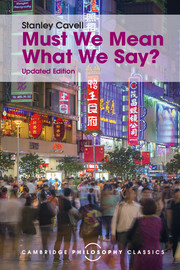Book contents
- Frontmatter
- Dedication
- Contents
- Permissions
- Acknowledgements
- Preface to this edition
- Preface to updated edition of Must We Mean What We Say?
- Foreword: An audience for philosophy
- 1 Must we mean what we say?
- 2 The availability of Wittgenstein's later philosophy
- 3 Aesthetic problems of modern philosophy
- 4 Austin at criticism
- 5 Ending the waiting game: A reading of Beckett's Endgame
- 6 Kierkegaard's On Authority and Revelation
- 7 Music discomposed
- 8 A matter of meaning it
- 9 Knowing and acknowledging
- 10 The avoidance of love: A reading of King Lear
- Thematic index
- Index of names
5 - Ending the waiting game: A reading of Beckett's Endgame
Published online by Cambridge University Press: 05 November 2015
- Frontmatter
- Dedication
- Contents
- Permissions
- Acknowledgements
- Preface to this edition
- Preface to updated edition of Must We Mean What We Say?
- Foreword: An audience for philosophy
- 1 Must we mean what we say?
- 2 The availability of Wittgenstein's later philosophy
- 3 Aesthetic problems of modern philosophy
- 4 Austin at criticism
- 5 Ending the waiting game: A reading of Beckett's Endgame
- 6 Kierkegaard's On Authority and Revelation
- 7 Music discomposed
- 8 A matter of meaning it
- 9 Knowing and acknowledging
- 10 The avoidance of love: A reading of King Lear
- Thematic index
- Index of names
Summary
Various keys to its interpretation are in place: “Endgame” is a term of chess; the name Hamm is shared by Noah's cursed son, it titles a kind of actor, it starts recalling Hamlet. But no interpretation I have seen details the textual evidence for these relations nor shows how the play's meaning opens with them. Without this, we will have a general impression of the play, one something like this: Beckett's perception is of a “meaningless universe” and language in his plays “serves to express the breakdown, the disintegration of language”—by, one gathers, itself undergoing disintegration. Such descriptions are usual in the discussions of Beckett I am aware of, but are they anything more than impositions from an impression of fashionable philosophy?
Martin Esslin, from whom I was just quoting, applauds Beckett for his veridical registering of the modern world. Georg Lukacs deplores Beckett as an instance of the modernist writer who, while accurately registering something about our world, fails to see that his response to that world (in subjectivity, angst, formalism, psychopathology) is chosen, and partial—in particular, a choice against a socialist perspective from which alone possibilities for the future of human society can be spoken for by artists. One recognizes the sorts of production which fit Lukacs’ descriptions, the amusements which sell the world its own weirdness. Both Esslin and Lukacs take Beckett's work much as any corrupted audience takes it, except that Lukacs maintains the classical demand of art, that the artist achieve perspective which grants independence from the world within which he is centered; that he not allow himself merely to pander to the world, becoming one of its typical phenomena, but that he witness it, helping the world to see its phenomena by providing his perspective. Esslin speaks with those who have forgotten that such a perspective is necessary, or who assume that it is no longer possible. Lukacs proposes to bring society and art back together by demanding that the artist's perspective be provided by a particular social attitude or choice. Both views are blind to the fact that in modernist arts the achievement of the autonomy of the object is a problem—the artistic problem.
- Type
- Chapter
- Information
- Must We Mean What We Say?A Book of Essays, pp. 107 - 150Publisher: Cambridge University PressPrint publication year: 2015
- 1
- Cited by

